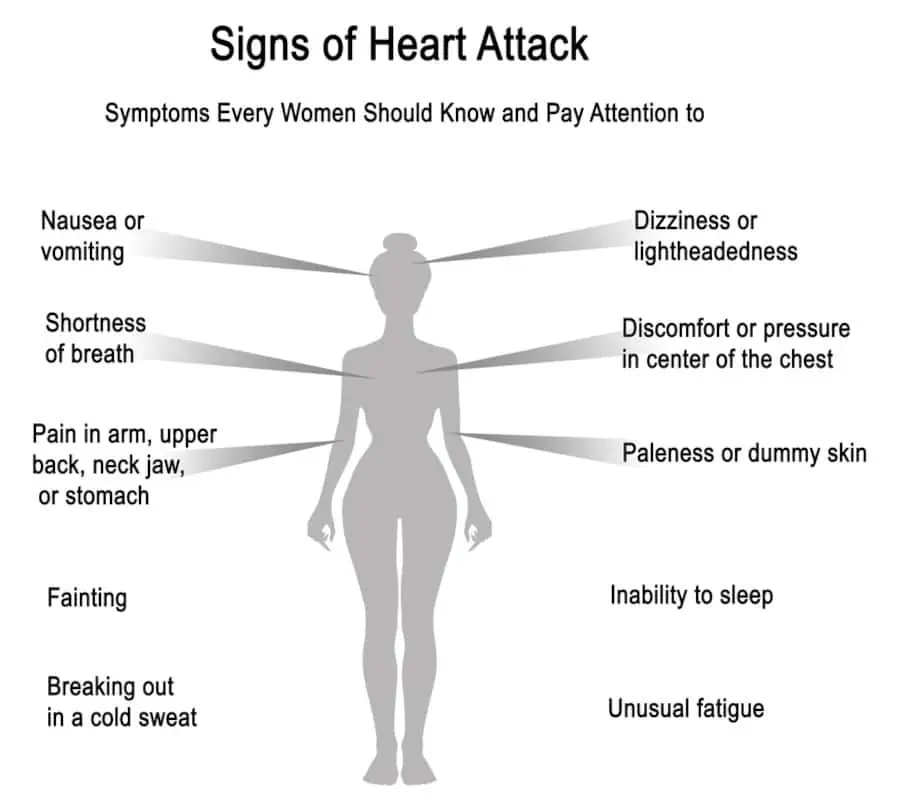Have you heard that heart attacks are more common in the morning? While it may seem strange, there is some truth to the fact that certain times of the day have an increased likelihood of myocardial infarction (heart attack). A decent amount of heart attacks occur between three and four in the morning. The reason isn’t necessarily due to sleep apnea, midnight snacking, or being blissfully unaware of the symptoms while we sleep.
Surprisingly, it has something to do with hormones. But to fully understand why you may be more susceptible to a heart attack in the early hours, it’s essential to first know the general risk of heart attack for women.

How common are heart attacks in women?
The Centers for Disease Control and Prevention (CDC) report that heart disease is the leading cause of death for women in the United States. Heart disease is a broad term that refers to many heart conditions, but one of the most common symptoms shared by various heart issues is impaired blood flow to the heart. When blood flow to this vital organ is cut off or significantly reduced, the result is usually a heart attack. This differs from sudden cardiac arrest — when the heart suddenly ceases to beat.
Heart disease, including cardiac events like heart attacks, is very serious. According to the CDC, Heart disease kills around one in five American women every year. What is more concerning is that heart attacks in women are more likely to be caused by something other than coronary artery disease. Sadly, this can lead to female heart disease being misdiagnosed, especially if they and their providers are unaware of the symptoms of heart attack in women and their risk factors.
Additionally, when comparing female heart attack statistics by age, women may experience heart attacks at older ages compared to men. According to the American Heart Association, the average age of a woman’s first heart attack is 72, over seven years older than the average age for males, which is 65.5. However, in the past 10 years, the average age has been decreasing. New research from the American College of Cardiology reported that heart attacks in individuals under 40 have risen by 2% in the last decade. It’s suspected that lifestyle changes — like more time sitting at a computer or a diet heavy in fast food — could be exacerbating common causes of heart attacks.
What are the causes of early morning heart attacks in women?
Perhaps the most well-known cause of heart attacks, coronary artery disease, is when fat deposits, known as plaques, build up in the major blood vessels leading to the heart. Plaques in the coronary arteries can restrict or block blood flow to the heart, causing a heart attack.
However, causes of heart attacks and heart disease risk factors for women tend to vary. Some things that increase a woman’s risk of heart attack, according to the National Heart, Lung, and Blood Institute (NHLBI) include:
- High blood sugar (possibly from artificial sweetener consumption)
- High blood pressure
- Menopause
- Pregnancy complications
- Low levels of physical activity
- Increased stress
Stress hormones in particular may contribute to early morning heart attacks or heart failure.
What time of day do most heart attacks occur?
Researchers have found that artery blockage and sudden cardiac death peak in the early morning hours. Additionally, cardiovascular events are positively correlated to a certain day of the week — Monday morning. Why do most heart attacks take place between 3 and 4 am? The increased likelihood of a heart attack in the morning is related to your body’s natural rhythm and hormones.
Why heart attacks happen in the morning
First, some scientists theorize that stress hormones are linked to morning heart attacks. When you wake up, your body releases a stress hormone known as cortisol to help wake you up and get you moving. For many individuals, your highest cortisol levels are when you rise. In the evening, they decrease as your body prepares for sleep. It is a natural part of your body’s circadian rhythm, or “internal clock.” However, stress can have a bigger influence on female heart attack risk. Therefore, some speculate that the elevated cortisol levels in the morning create the perfect storm for triggering a heart attack.
Other researchers believe it isn’t necessarily cortisol secretion but PA1, a protein in your blood. One study showed that PA1 is also highest when a person wakes up. Increased PA1-cells are important because they prevent blood clots from breaking down. The higher your levels of PA1, the higher your risk of a blood clot — which can cause a heart attack. It’s unclear if PA1 levels are related to the circadian rhythm or things like posture (lying down) and inactivity.
Whether it’s “stickier” blood platelets in the morning or elevated activity in your adrenal glands, many heart attacks occur between the hours of 4 and 10 in the morning. Adding insult to injury, signs of heart attack in women can be more difficult to recognize, especially in the morning when you’re not fully alert.

What heart attack symptoms may be easily missed in the morning?
Regarding pre-heart attack symptoms, women aren’t looking for typical signs like arm and chest pain. While women may also experience chest pain (angina), they’re also more likely to experience:
- Shortness of breath
- Jaw pain
- Indigestion
- Anxiety
Sometimes, women have these warning signs without chest pain, making it hard to know if they are actually having a heart attack. Some of these symptoms can easily be related to another problem, such as waking up anxious about all the things on your to-do list, or indigestion pain from lying down.
Sadly, incidence of heart attack misdiagnosis in women occurs around 5% of the time compared to just 3% in men, says one study, making it vital to know the symptoms of a heart attack and when to seek help. Educating yourself on female vs. male heart attack symptoms is a great first step. The bottom line is, if you’re at all concerned about a heart issue, it’s best to get medical attention. Especially because suffering a heart attack in the early morning hours may be more serious.
Are heart attacks more dangerous in the morning?
Unfortunately, the time when most heart attacks seem to occur (the morning) may also be the most damaging time to experience myocardial infarction. One study reported that individuals who have a heart attack between 6 am and 12 pm suffer 20% more damage to their heart muscle than those who have a heart attack later in the day. Researchers aren’t clear if heart attacks in the morning were more major or if it took the patient longer to receive care due to the time of day. Nevertheless, morning heart attacks do appear to be more catastrophic.
After a heart attack, the heart muscles may become weakened. Damage to the heart muscle may lead to arrhythmias — a problem with your heart rhythm. An arrhythmia doesn’t necessarily increase your risk of another heart attack but one study found that around 1 in 5 people who had a heart attack will be admitted back to the hospital for a second attack within five years. Therefore, it is important to monitor your heart rate and take steps to encourage heart health. Your cardiologist may recommend a healthy diet, moderate exercise, and lowering cholesterol levels to prevent plaque buildup.
Have questions about your health? Talk to Dr. Aliabadi
Dr. Aliabadi isn’t only an expert OB/GYN, but is knowledgeable in all aspects of women’s health and well-being. While she can’t treat your heart attack, Dr. Aliabadi and her caring, supportive staff are available to support you through menopause, childbirth, infertility, or even just routine gynecological care.
We invite you to establish care with Dr. Aliabadi. Please make an appointment online or call us at (844) 863-6700.
The practice of Dr. Thais Aliabadi and the Outpatient Hysterectomy Center is conveniently located for patients throughout Southern California and the Los Angeles area. We are near Beverly Hills, West Hollywood, Santa Monica, West Los Angeles, Culver City, Hollywood, Venice, Marina del Rey, Malibu, Manhattan Beach, and Downtown Los Angeles.















